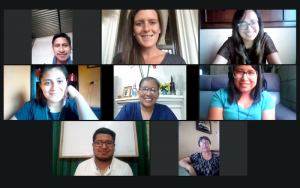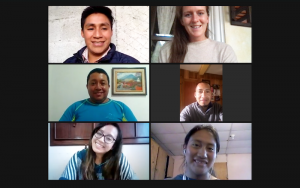
24 May MathMobile Fuels Quality Education
In most people’s minds, math is synonymous with numbers. Doing math means starting with a set of numerical values and maneuvering them according to preestablished rules to achieve a correct answer.
Math is actually much more. In fact, the word “mathematics” comes from a Greek term meaning knowledge, study, or learning. Math skills give students a foundation that extends beyond numbers. They become empowered to generate ideas, discover patterns, and solve problems collaboratively.
Math Proficiency in Guatemala
Measures of math proficiency in Guatemala show that the majority of students do not develop these skills. In 2019, only 22% of 15-year-olds in Guatemala scored above the lowest level on an international math assessment. In other words, 78% of students are not “able to follow a single clearly stated instruction to perform a single step or operation.”
Research has conclusively demonstrated that effective math teaching improves students’ proficiency. So, we designed a program late in 2019 called the MathMobile. Our plan was to bring highly trained instructional coaches to teachers’ classrooms for practice with their students. The coaches would support teachers as they shifted towards student-centered instruction.
Then came COVID.
Pivoting to Virtual
With schools closed, we had to scrap our original design. We took another look at our goals for the MathMobile and realized that we could still accomplish them through a virtual delivery. Even better, we could bring together teachers from different parts of the country, since geographic proximity was no longer a requirement.
The next step was to assess whether teachers were interested in a virtual version of the MathMobile. This data came through two routes: surveys and round table discussions. We invited teachers in Guatemala, who had participated in our past programs, to attend Zoom discussions. Those who weren’t able to participate had the opportunity to complete surveys.

These teachers come together from areas of Guatemala outside Sacatapéquez. Fátima and Alix are on the top row, right and center, respectively.
Needs Assessment
When asked about their challenges, priorities, and needs, teachers revealed that they had pursued various creative ways of reaching their students. Depending on their internet connectivity, they were recording videos on YouTube, sending lessons on WhatsApp, or holding Zoom sessions. “How do we teach in this [pandemic] environment?” was a question that came up frequently. They expressed interest in exploring answers with us but were concerned about making an extensive time commitment.
Our Guatemala education team, composed of Alix Van Zandt, Director of Programs, and Fátima Santos, Math Coach, examined the teachers’ input and consulted with Education Advisory Board member Dr. Kristin Johnson. Together they devised a customized program.
Design Phase
So as not to crowd teachers’ packed schedules, sessions occur every other week in circumscribed modules of six. This structure creates flexibility in adapting to the pandemic’s unpredictable surges.
Another benefit to six-session modules is that they allow a continuous feedback loop to ensure high-quality training. Alix and Fátima develop each session with support from an expert coach, Dr. Carolina Napp-Avelli, an education professor at the University of Maryland. As teachers let our team know what they find most relevant and impactful, future modules can be improved.
The design of the MathMobile follows research-based best practices in mathematics education. Our team models student-centered strategies aligned with our Principles for Effective Teaching, engaging teachers as co-learners in exploring mathematical concepts. The program’s objective is to recalibrate teachers’ definition of effective teaching from traditional, rote memorization to student-driven collaboration.
The virtual MathMobile follows our Learn—Apply—Lead model. During the time for reflection built into each session, teachers talk about their math classes and how they are applying what they are learning. They share successes as well as challenges and brainstorm together how to respond. Long term, participants will become teacher leaders in their own schools who have the skills needed to coach their peers. They will also have the opportunity to lead presentations at our annual November Conference.

These Sacatapéquez teachers all live in a southern central department of Guatemala.
MathMobile Hits the (Remote) Road
Our virtual MathMobile launched at the end of March with two cohorts of teachers, one from the Sacatepéquez department and one from other areas. These 13 women and men represent public, private, and NGO-funded schools. Their students range from second grade to middle school. They are located in urban centers and rural areas, the most remote of which is an 18-hour bus ride from Guatemala City.
What unites them is their desire to develop themselves as educators. Fátima describes the MathMobile as “an experience of continuous learning and application, where we share ideas and knowledge.”
At the halfway point, enthusiasm has been high. Because the MathMobile is our first extensive program that relies on teachers to opt-in with no accountability to their administrators, our expectations were measured. However, these teachers have fully committed to learning a student-centered approach. Despite divergent educational settings, they have already demonstrated the ability to apply quality instruction in their contexts. Alix says, “In all of the sessions, the participation is like nothing I’ve ever seen before.”
MathMobile participants’ comments confirm Alix’s observation. Hear from two of them:
- “[MathMobile] has shown me the importance of sharing answers in groups for effective learning, that students can have many different processes for getting their answers, and to have in mind that we are guides for our students.”
- “[In Math Mobile] we learn about how to explore different ways of coming up with a solution and then how to share your ideas with your peers and work together as a team to listen and decide what strategies are the most effective. Listening to my fellow teachers’ strategies and approaches helps me understand my own better and that there can be many ways to get to the same solution.”
Looking Ahead
The first MathMobile module will conclude in July. The second and third modules will follow after a short break in order to finish before our annual November Conference at the end of the school year, where we hope to have MathMobile graduates lead workshops.
Once schools in Guatemala are permanently reopened, this program will serve as a springboard for an in-person MathMobile. The next stage will capitalize on the interest generated among teachers to build upon their content knowledge and pedagogical approach in alignment with our Principles. The ultimate goal is for participants to be equipped to lead professional development workshops themselves.
In the future, we hope to be able to reach across the digital divide to include more teachers in the virtual MathMobile. Many of our previous partner schools are in rural areas where remote work isn’t common or possible.
“We’re trying to figure out how we can support them to participate in these spaces,” remarks Alix. “That’s something we’re thinking about: How can we access those teachers?”
No Comments